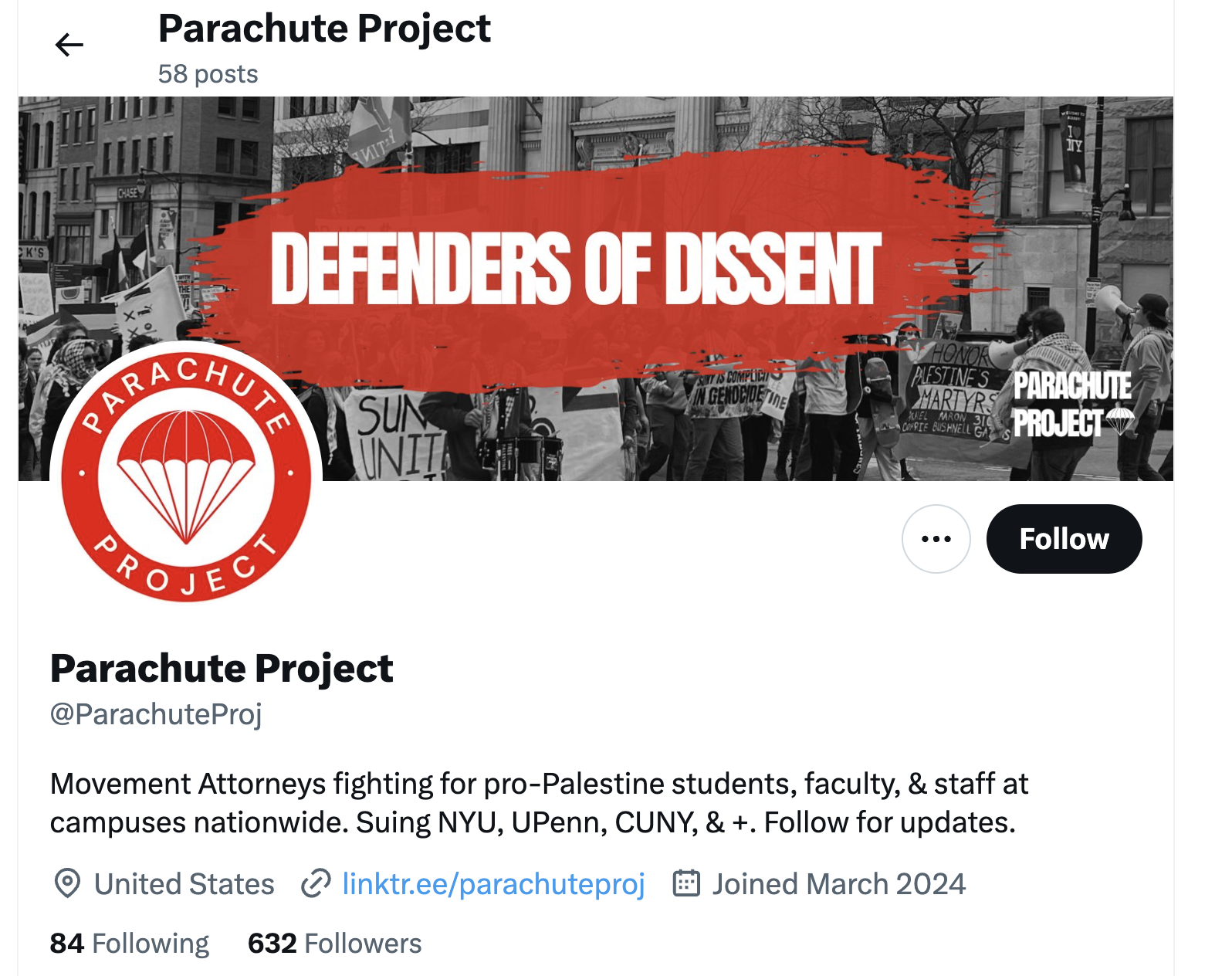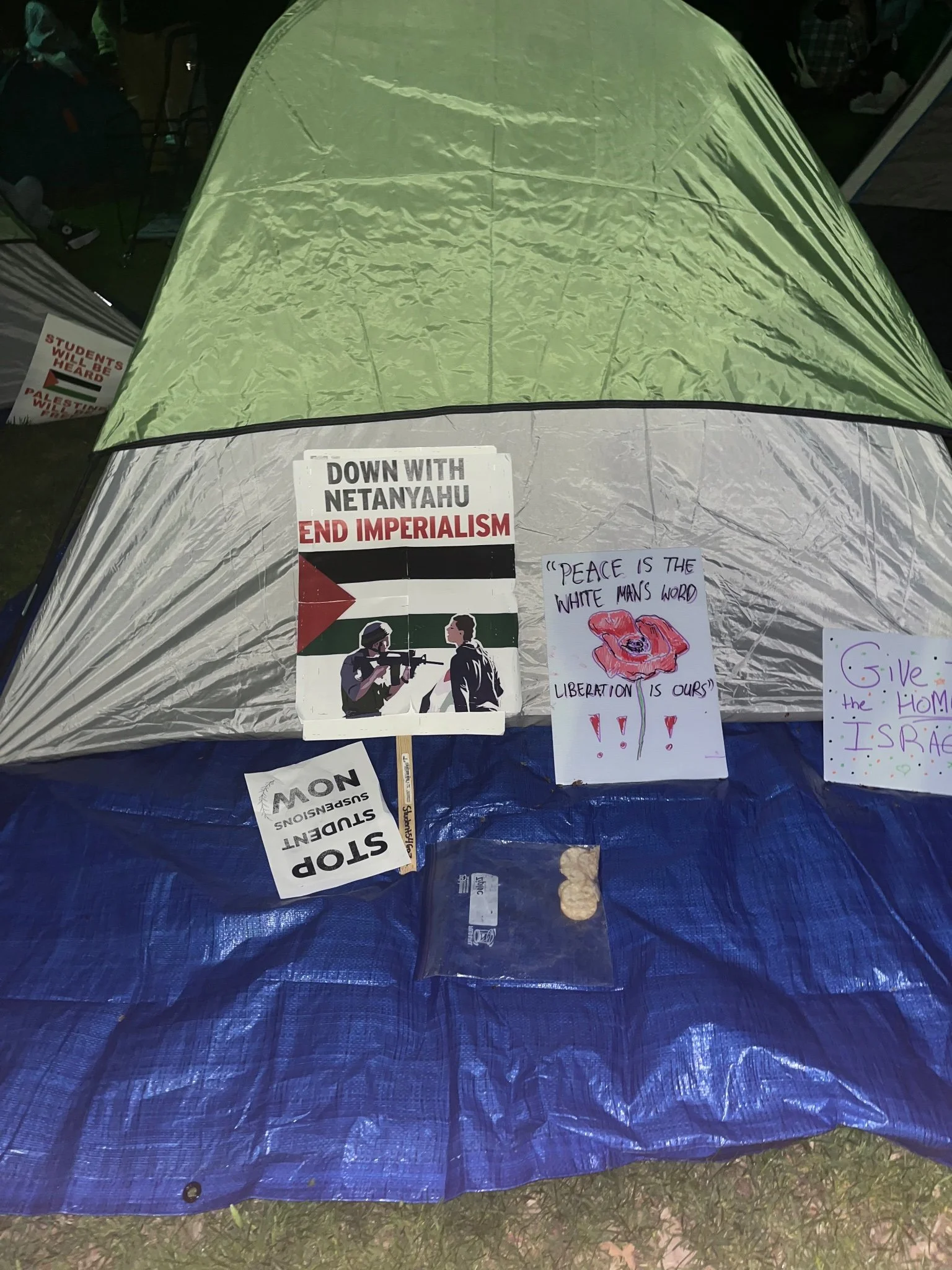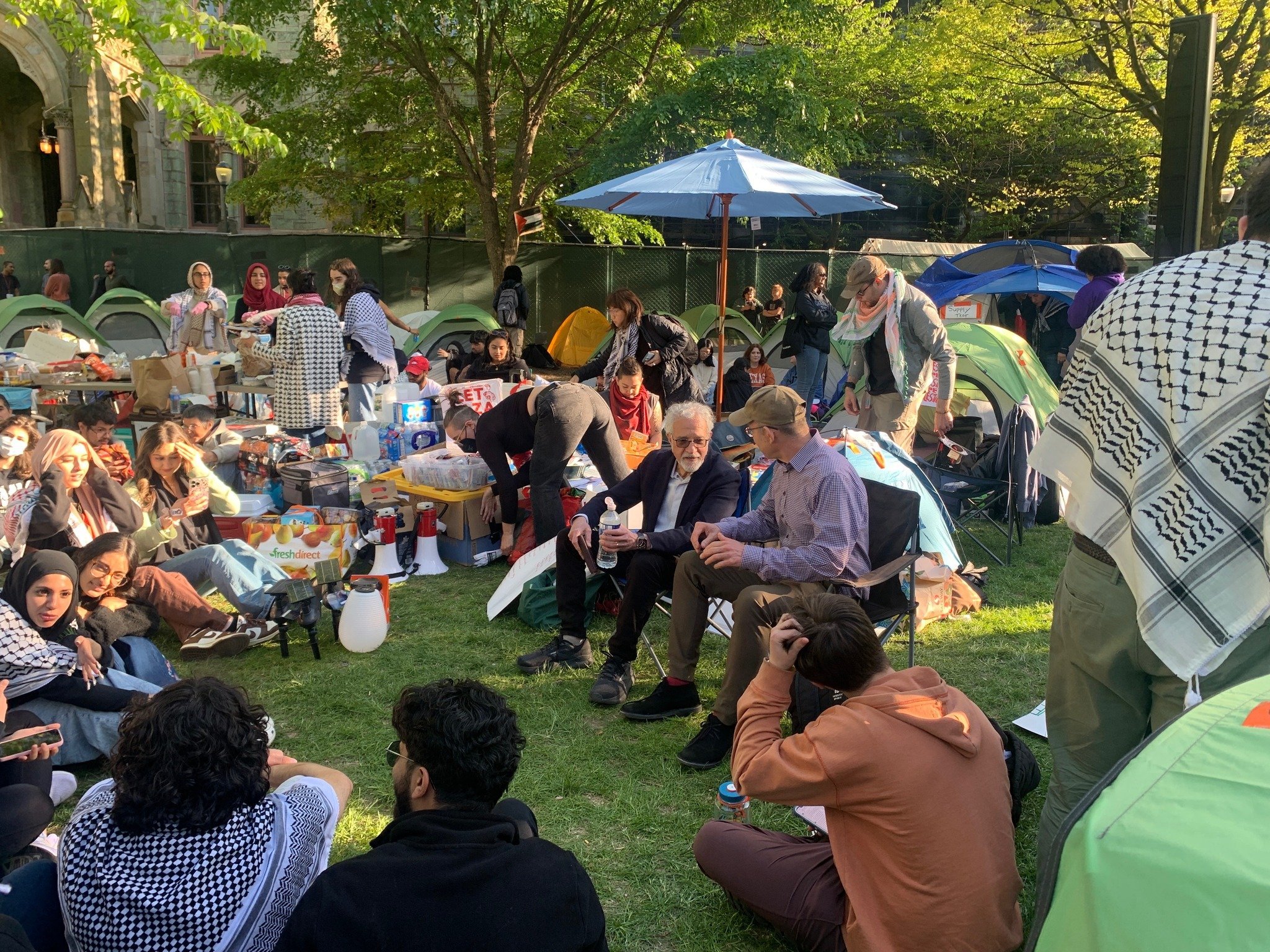Pro-Palestine Faculty Sue University of Pennsylvania
Lauren Abunassar
Two pro-Palestine faculty members at the University of Pennsylvania (Penn) along with Penn Faculty for Justice in Palestine (PFJP) filed a lawsuit against the university in an attempt to prevent it from complying with a U.S. congressional committee’s demands to hand over confidential documents on its pro-Palestine faculty and students.
Penn Faculty for Justice in Palestine have filed a suit against the University in an attempt to prevent it from complying with a U.S. congressional committee’s demands to hand over confidential documents on its pro-Palestine faculty and students. On January 29th, PFJP organized a die-in on campus. Credit: Joe Piette
On January 24, the United States House Committee on Education and the Workforce sent a letter to Penn demanding that the university turn over information on faculty, students, and staff who have critiqued Israel or expressed pro-Palestine sentiments. The Committee purports to be investigating the Ivy League university’s lack of adequate response to reported instances of anti-Semitism on campus. Yet, faculty who filed the suit refute that the Committee actually cares about anti-Semitism.
“This action is not about real anti-Semitism,” their suit, filed on March 9, reads. “This action instead concerns the McCarthyesque use of a vague, overboard, patently unconstitutional definition, which is termed anti-Semitism in egregious ontological error, to chill, punish and end virtually all moral, political, legal, and other criticism of the nation-state Israel.
The PFJP and the two tenured professors named as plaintiffs in the suit, Huda Fakhreddine and Eve Troutt-Powell, insist that the sanctity of academic freedom and free speech are at stake.
Huda Fakhreddine is an Associate Professor of Arabic Literature at Penn and a plaintiff named in the lawsuit against Penn.
Both have been targets of brutal doxxing campaigns and University investigations since the December 5th televised congressional hearing that launched the probe.
The University has already supplied the congressional committee with some documentation. The plaintiffs’ attorneys, Jonathan Wallace and Shahily Negrón, aim to prevent further damage. They say they are optimistic that the injunction and the lawsuit that they filed will prevent a “McCarthyesque witch hunt.”
“Our clients are no longer on the defense. We are directly holding Penn accountable for the horrendous treatment and attacks against pro-Palestinian supporters on their campus,” said Wallace who co-founded the Palestinian-solidarity legal advocacy group that filed the suit, Parachute Project, with Negrón in 2023.
Their case is just the latest battle in a war that began when the committee questioned University of Pennsylvania President Liz Magill and the presidents of MIT and Harvard University during a nearly five-hour televised congressional hearing. The Republican-led committee claimed the hearing would be both the beginning of a probe into anti-Semitism on U.S. campuses, as well as an examination of the supposedly competing university principles of student safety and free expression, particularly since October 7.
Eve Troutt Powell is a Professor of History and Africana Studies at Penn and a plaintiff named in the lawsuit against Penn.
The immediate consequences of the hearing were clear and swift: Magill resigned, two Penn students filed a lawsuit against the University, claiming it did not adequately respond to anti-Semitism on campus, and the congressional committee demanded that Penn turn over information on pro-Palestine faculty, students, and staff.
The lawsuit filed by pro-Palestine faculty alleges that the congressional committee has affiliations with pro-Israel groups and billionaire donors who are intent on advancing a false narrative of Penn as a rampantly anti-Semitic campus, that has created an increasingly unsafe learning environment for Jewish students.
The bottom line, the suit insists: “Criticism of the nation-state, Israel, including statements of anti-Zionism, are First-Amendment-protected speech... This new McCarthyism, which was growing slowly before the Hamas atrocities on October 7, 2023, but is surging up very rapidly now, has already been hugely successful at ending careers and blighting lives, just like its predecessors.”
According to Negrón, the impulse to vilify any pro-Palestinian or anti-Zionist speech is becoming an increasingly pervasive standard, even outside the boundaries of university campuses. “Any form of Palestinian content or sympathy is seen as wrong,” Negrón said in an interview with Al-Bustan.
Wallace and Negrón co-founded the Parachute Project – dedicated to providing legal support to activists – in response to a wave of attacks on Palestinian solidarity activists since October 7. Negrón says that she and Wallace have seen a surge in Palestine-related cases. The two currently represent over 250 people of all ages, professions, and ethnicities. Negrón’s youngest client is just 12 years old.
Attorneys representing Penn faculty for justice in Palestine co-founded the Parachute Project in response to a wave of attacks on Palestinian solidarity activists since October 7.
While the Penn case may be emblematic of the fight for privacy, academic freedom, and free speech, Negrón says it also underscores the limitations of a legal system that has not yet caught up to the weaponization of new technology.
“Doxxing and exposing peoples’ names and information causes injury in ways we’ve never seen in the legal system before,” Negrón said. “That’s something we’re arguing right now in court with Penn because they’re arguing there is no injury.”
But in fact, Negrón says, some of these injuries began when Fakhreddine first heard her name and her university course description called out directly during the congressional hearing in December. A professor of Arabic poetry, Fakhreddine was shocked when her course was called “terrorist” simply because it makes mention of Palestinian author and politician Ghassan Kanafani. After suffering silently with the consequences of her public miscasting as an anti-Semite, Negrón says another faculty member put the two in touch to see what legal recourse there may be.
“The Congressional committee does not have university interests in mind,” Fakhreddine told Al-Bustan. “The purpose of this committee is to dismantle the idea of a university and to shut down free thinking, critical thinking, and academic freedom by pitting [Jewish and Arab/Palestinian communities] against each other and taking advantage of the trauma on both sides,” Fakhreddine added.
“This country just cannot stomach the fact that Palestinians are human beings and that their right to exist is at risk.”
While Fakhreddine sees the university as a place where culture and a free exchange of ideas should be celebrated, she worries about the broader implications of seeing it transformed into a place where culture, and the mere right to exist, must be defended. Not only does she see the congressional investigation as uninterested in Jewish students’ safety, but she also sees it as an ultimate undermining of the University's values of free speech and expression and the right to protest.
In addition to being inundated with a brutal onslaught of hate mail since the committee’s investigation began, Fakhreddine was dropped from several professional commitments, leading to financial, mental, and emotional stress. The nature of this damage is precisely what Negrón is now working to prove in court, citing this as evidence that Penn’s ongoing compliance with the congressional probe would be both a violation of Fakhreddine’s right to privacy and free speech and would put her at continued risk of harm.
On April 25, students at Penn built an encampment in solidarity with Gaza. Penn's interim president ordered the protesters to disband, but the students have remained steadfast and their protests continue. Photo credit: Huda Fakhreddine.
Though it’s unclear precisely how much documentation the University has already turned over to the committee, a Penn spokesperson told CNN that their initial document exchange back in February would be a part of a “rolling production” of documents that would continue. Despite faculty allegations against Penn, the university rejects the complaints and insists that no injury has been caused and that if it has, Penn is not responsible for it.
While Negrón and Wallace have filed a preliminary injunction motion to attempt to block Penn from providing the congressional committee with any more confidential documents, Penn is continuing its efforts to see the fight formally dismissed in court.
“My first thought was ‘none of us are safe.’”
On April 3, Penn’s attorney, Seth P. Waxman of Wilmer Cutler Pickering Hale & Dorr, requested a pre-motion conference to present grounds for dismissal of the suit to Judge Mitchell S. Goldberg of the U.S. District Court for the Eastern District of Pennsylvania, reports the Pennsylvania Record. Waxman states that concrete and impending injuries to the plaintiffs have not been proven.
Many pro-Palestine faculty and students at Penn fear that the University will continue to act in ways that are detrimental to their well-being.
“I first got word of the investigation watching the congressional hearing on television,” said Troutt-Powell in an interview with Al-Bustan. “And my first thought was ‘none of us are safe.’”
When the idea of filing suit was first floated, it was an easy decision for Troutt-Powell to lend her name to the filing. Her conscience practically demanded it, she said. As a history professor focusing on the modern Middle East and the history of slavery in the Nile Valley and the Ottoman Empire, Troutt-Powell is uniquely positioned between two different academic departments at Penn — History and Africana Studies. While she says she has felt welcomed by the Africana Studies Department, she notes that the History Department’s active silencing of any discussion and critical debate on the unfolding crisis in Gaza has left her deeply dismayed. “There is no support at all,” Troutt-Powell said. “I felt like the university was on the road to betraying us.”
Penn Faculty for Justice in Palestine held a die-in demonstration at College Hall on Jan. 29. Credit: Abhiram Juvvadi.
Students, not just faculty, are suffering, said Troutt-Powell, who teaches a group of 17 graduate students struggling with the University’s efforts to silence debate and discourse. Troutt-Powell theorizes that the University’s silencing tactics have to do with the fact that most donors don’t truly understand what a humanities or social science education is and don’t want to sacrifice the legacy she believes Penn once held as a so-called Ivy League sanctuary for Jewish faculty and students. “[Donors] are fighting to keep what was sacred to them for generations and many of these people do not recognize that their grandchildren may not feel the same way,” Troutt-Powell said.
Although Troutt-Powell said she would have been ashamed if she hadn’t joined the lawsuit, she is also cognizant of the effect this battle is having on her and her family. She has been targeted just like Fakhreddine, fielding hate mail, and finding herself added to an online list compiled by Canary Mission, a website devoted to doxxing pro-Palestinian students, professors, and activists. The site blacklists anyone it considers to be anti-Israel or anti-Zionist. “I don’t relish it, but I’m not unproud of it,” Troutt-Powell laughed, acknowledging the bitter reality of what it means to errantly conflate anti-Semitism and anti-Zionism.
The congressional committee’s letter, meanwhile, is simultaneously sweeping and vague in its demands and accusations. The letter insists that the university share with it all reports of “anti-Israel protests at Penn, and any disruptions to education and student life related to them,” as well as any social media posts by Penn students, faculty, and staff targeting Israel, Zionism or Zionists, Jews or Israelis. The letter also calls for the university to turn over all documentation related to Students Against the Occupation, the Freedom School for Palestine, and the 2023 Palestine Writes Festival, which was held at Penn.
The demonization of the festival — dedicated to celebrating and promoting Palestinian literature, art, and culture — is symbolic of a deeper systemic racism, according to Fakhreddine. “This country just cannot stomach the fact that Palestinians are human beings and that their right to exist is at risk. Visibly. Not theoretically,” she said. “When you start allowing influences like this in a university, that’s the end of it.
“Proof of genocide is available every hour, everywhere…”
For Fakhreddine and other Penn faculty like Troutt-Powell, acknowledging the deeply entrenched and multifaceted harms woven into an investigation like this means acknowledging the vulnerability of the university system to what Fakhreddine calls a ‘“far-right Republican white supremacist takeover.’ “It’s a trap and the purpose of it is the dismantling of DEI,” Fakhreddine said, referencing diversity, equity, and inclusion, the organizational frameworks which seek to promote the fair treatment of all people, particularly groups who have historically been underrepresented or subject to discrimination.
Fakhreddine believes that the lawsuit might actually serve as a means to protect the university from pressure to comply with the investigation
More than anything, according to Fakhreddine, the congressional investigation of Penn is just a horrific distraction from the crucial issue at hand: Israel’s bombardment of Gaza.
On April 26th, Professor of Holocaust and Genocide Studies at Brown University Omer Bartov visited the Penn student encampment, where he was in conversation with fellow Israeli, Raz Segal, Associate Professor of Holocaust and Genocide Studies at Stockton University, about the perils of anti-Semitism and its current weaponization.
“Proof [of genocide] is available every hour, everywhere,” Fakhreddine said. “What we’re going through on American campuses is a huge distraction. We should be watching Gaza because that is where history is turning.”
For Negrón, both the lawsuit and the investigation have major historical ramifications. “I have no doubt this will go to the Supreme Court,” she said. Historic human rights battles, she added, all began with cases like this one.
Although she is aware of the far-reaching implications of the case, Fakhreddine says it’s a battle that feels tempered by her increased understanding of the shifting landscape of the university system and its growing distance from real academic freedom. “Faith in the institution? That I’ve lost entirely. I only have hope in students and faculty… There are many examples of brave people. History is on their side,” Fakhreddine said, adding, “I cannot imagine a future without a free Palestine. I am 42 years old and I’ve never believed [in its inevitability] as much as I believe now.”
***
Lauren Abunassar is a Palestinian-American writer and journalist. A Media Fellow at Al-Bustan, she holds an MFA from the Iowa Writers’ Workshop and an MA in journalism from NYU. Her first book Coriolis was published by the University of Arkansas Press as the winner of the 2023 Etel Adnan Poetry Prize.







